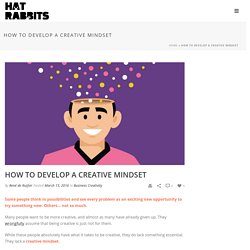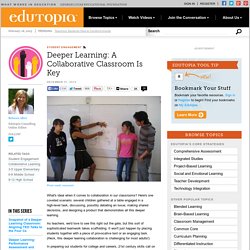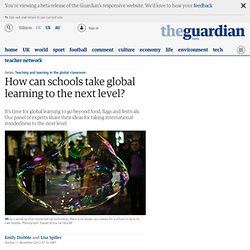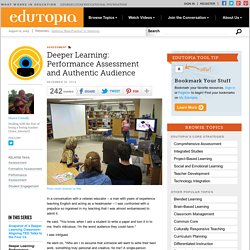

How to develop a creative mindset. Some people think in possibilities and see every problem as an exciting new opportunity to try something new.

Others… not so much. Many people want to be more creative, and almost as many have already given up. They wrongfully assume that being creative is just not for them. While these people absolutely have what it takes to be creative, they do lack something essential. They lack a creative mindset. The creative mindset Coming up with original ideas is not a mysterious talent you simply have to been born with. One of these habits is always looking past the first good idea. While going for quantity is a good start, there is another factor that decides whether you are creative or not: the creative mindset. How to train your creative eye Seeing possibilities where others only see problems; it’s a child-like trait that many of us have lost while growing up. The secret to developing a new habit is repetition. Being all serious and grown up, this perspective might frighten you.
Change The Structure of Your Brain! Neuroplasticity. Deeper Learning: A Collaborative Classroom Is Key. What's ideal when it comes to collaboration in our classrooms?

Here's one coveted scenario: several children gathered at a table engaged in a high-level task, discussing, possibly debating an issue, making shared decisions, and designing a product that demonstrates all this deeper learning. As teachers, we'd love to see this right out the gate, but this sort of sophisticated teamwork takes scaffolding. It won't just happen by placing students together with a piece of provocative text or an engaging task. (Heck, this deeper learning collaboration is challenging for most adults!) In preparing our students for college and careers, 21st century skills call on us to develop highly collaborative citizens -- it's one of the 4 Cs, after all. So how do we begin this scaffolded journey? Establish Group Agreements Deciding on group norms, or agreements, right at the get go will give each student a voice and provide accountability for all.
Why is Creativity Important in Education? Sir Ken Robinson Video Series from Adobe Education. How can schools take global learning to the next level? For the past week, we've been exploring global awareness in schools and sharing ideas about how our students can become internationally minded and develop as true global citizens.

It's become clear over this week just how vital these skills are if our students are going to thrive as adults - and in an increasingly interconnected world there's really no excuse for students and schools to live in a bubble. As part of this series we ran a live chat so teaching professionals could come together and share best practice, new thinking and ideas. Thanks to everyone who took part. The live chat uncovered so many fantastic ideas and tips that we have pulled out the best for you here: Joe Dale, independent consultant and former languages teacher International perspectives can really make learners reflect on their own as well as others' contexts particularly when schools collaborate on a more personal level. Steven Mark, director of the International Primary Curriculum It's all about going deeper.
Snapshot of a Deeper Learning Classroom: Aligning TED Talks to the Four Cs. Edutopia is pleased to premiere the first blog in a new series designed to showcase compelling examples of how students are developing 21st century skills through a deeper-level of learning. Through this blog series, we hope to increase awareness and encourage replication of successful models. Chris Anderson, TED curator. (Photo credit: Pierre Omidyar via Wikimedia Commons) As many of my readers know, this year I have been dedicated to using the 21st Century four Cs.
The four Cs are a rubric of sorts that help align lessons to more reality-based learning and assessing. As I design a lesson or assessment, I ask myself if what I've designed, or what the students must master, correlates to the important skills of: CollaborationCommunicationCritical ThinkingCreativity My lessons and tests must incorporate one or more of of the four Cs to, in my opinion, be worthy of spending precious instructional time in the classroom. ProcessEnvironmentContentProduct An example of this is my TED Talks unit. Deeper Learning: Performance Assessment and Authentic Audience. In a conversation with a veteran educator -- a man with years of experience teaching English and acting as a headmaster -- I was confronted with a prejudice so ingrained in my teaching that I was almost embarrassed to admit it.

He said, "You know, when I ask a student to write a paper and turn it in to me, that's ridiculous; I'm the worst audience they could have. " I was intrigued. He went on, "Who am I to assume that someone will want to write their best work, something truly personal and creative, for me? A single-person audience is a pretty lame audience, let alone the fact that I'm a middle-aged white guy. " That hit me like a rolled-up newspaper. As I absorbed this veteran educator’s words, I realized that not only was I wrong in my assumption that I (or any teacher) is a meanigful audience, but also that my assumptions about how grading and assessment work were so far removed from modern research that I might as well have been a 21st-century doctor treating humours.
This matters. 1. 2.